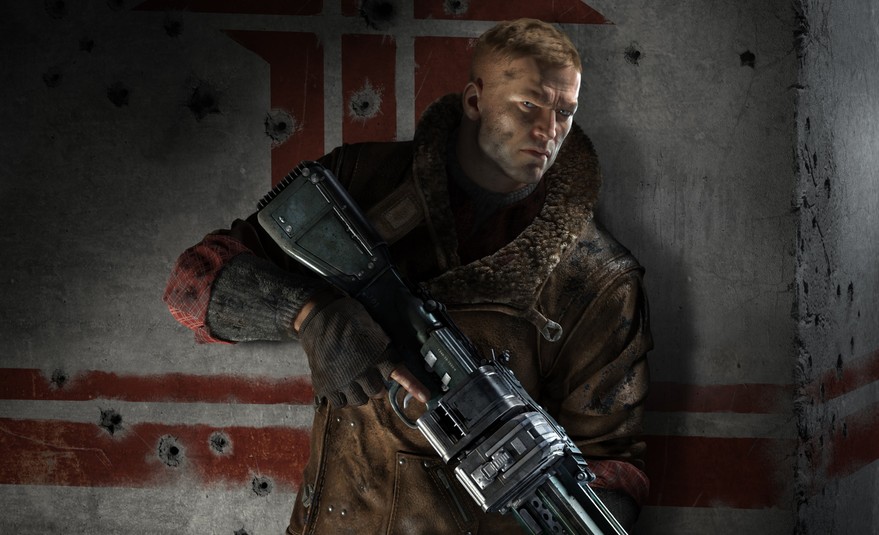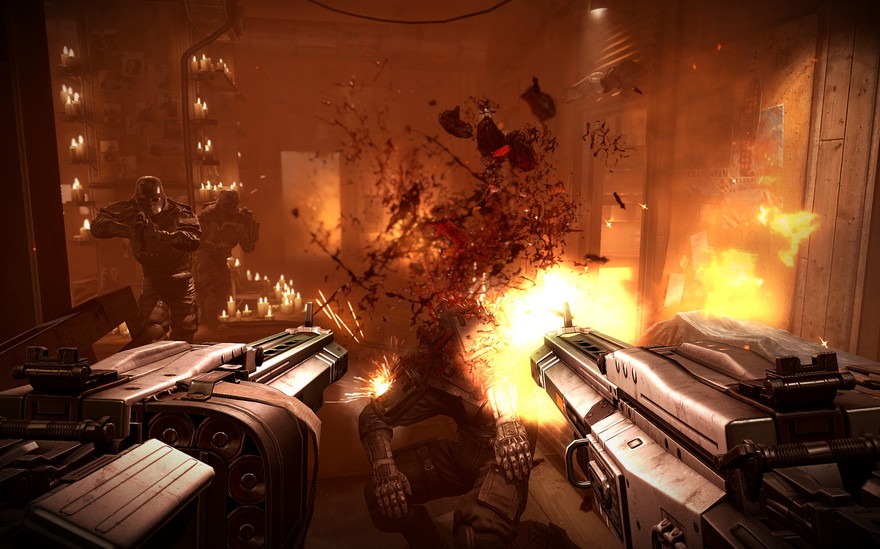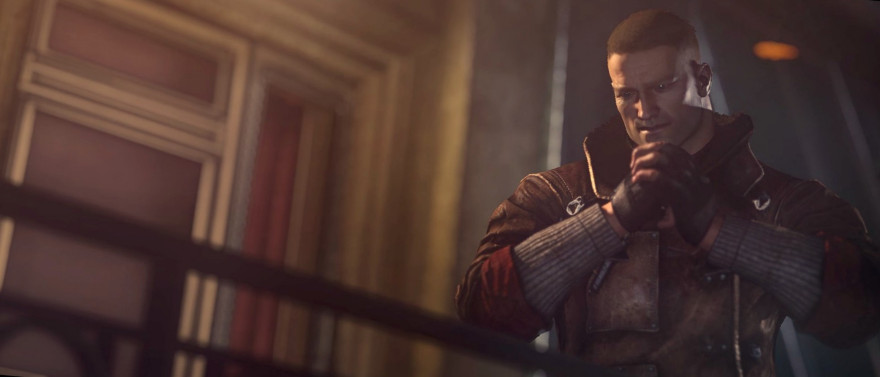You never escape the past in a first-person shooter; you kill the past and it comes back. The demons come back, the aliens come back, the terrorists come back, the Russians come back, the giant insects come back, the Triads come back. The player dies and comes back. The guns are hardly cool before every body rises again for the sequel. If the genre ever dies, it will soon come back.
So I’m not surprised, or in the least disappointed, to be shooting Nazis again this year. B.J. Blazkowicz, the original undying Nazi-hating gun rack, is the latest genre totem to return. He was always a less distinct presence than the hard-charging maniac from Doom, a guy who didn’t even have a name. But he’s also not a denatured product like the Soaps and Prices of Call of Duty, nor a corporate pitchman like Master Chief. He’s the face of a bold dumb era that won’t stay buried.
The new Wolfenstein makes a character out of Blazkowicz partly by insisting that he is boring. He’s square-jawed but unhandsome, unstoppable but rarely cool. His allies seem to be living fuller lives than he is, like the guy’s just a white background they pose in front of. All of his powers of expression are applied to the task of killing Nazis—and in that, at least, the guy’s an artist.

Muttering darkly to himself, he creeps through trenches and offices and lunar bases and empties them of other life. The game exults in tomato-can headshots and arms blasted into gristle. Bits pop off bodies with enthusiasm, like giant fingers had flicked them at a wall. And as foes turn to wet paper, Blazkowicz remains a rock.
He stomps through an eggshell world, and there’s plenty of it to break. The designers are stylists of the old school who favor long passages and heavy punctuation. They stay away from both the wide-open arenas and winding mazes that distinguished last year’s throwback Shadow Warrior, and keep the action penned mostly in corridors. Wolfenstein’s shooting lanes don’t catch your eye like the glass and neon bridges of the latest Killzone, either; they make for worse screenshots and better memories. You dash up a spiral staircase around a luminous spinning model of the moon, and spend a gory hour inching forward through the crowded guts of a U-boat. You destroy a bridge and hunt survivors through upended and teetering railway cars. The latter sequence feels like it’s calling out Uncharted 2: it’s the hanging-train level as actual level, not a series of scripted wows.

Wolfenstein also presents something resembling a soul to offset its inhuman thrills. Tidy, confident cinematics about Blazkowicz’s allies balance out his murderous on-mission ramblings (“Nazis…this ends today…more Nazis…They put a Nazi on the moon? Fuck you, moon”), although it’s hard to say which mode is more endearing. The writing is clipped and smart, keeping a level head in its approach to the fantastic. But there’s a channel-switching problem, like you’re flipping between the 24-hour MDK network and saner primetime programming.
The game’s themes are presented with economy. In a world where the Nazis won, Americana still stands for life and defiance. In addition to the “cowboy” Blazkowicz, its representatives include an unnamed guitarist who is almost certainly Jimi Hendrix. (Like a lot of odd ideas in Wolfenstein, the Jimi thing has a sort of amazing payoff.) The Nazis are industry and science, propagators of mechanized undeath. Sadistically, they make you perform QTEs: press Square to be tattooed with an identification number; press right, left, and down to operate a cement mixer.
But the whole game is so mechanically inclined that the contrast barely registers. The villain wants to build an army of “machine men,” but Blazkowicz seems like one already—a preternaturally calm and single-minded killing machine. “I move by roaring engines,” he says. Dual-wielded shotguns and assault rifles take the place of his arms, bobbing up and down at his sides as he runs. When carrying one gun, his fingers range over it constantly, toying with the slide and sights, popping the magazine out and giving it a glance like he’s inspecting his nails.
Blazkowicz has the untiring step and steely pragmatism of a robot. Of course he’ll eat dog food; it’s just fuel. Planes crash into him, he gets knocked out, he’s poisoned and stabbed in his double-wide chest more than once, but whatever’s in there keeps on ticking. As he executes his duties, he pushes aside his dream of a sepia-toned family and suburban backyard—“not for me,” he says, and the song that plays over the end credits says the same thing. (But is anyone actually boring enough to fantasize about being Grill Dad?) That soft stuff stays on the other channel.
Turning into a machine is both the game’s nightmare and its surreptitious fantasy. Isn’t every FPS player a brain transplanted into a living weapon? Stuck in stiff undying bodies, gun-arms akimbo, we savor a stretched and distorted and rewound moment of carnage that is never allowed to end. Narrative justifications are appreciated rather than felt. What Blazkowicz really stands for is that mechanical satisfaction that keeps returning for its own sake. In the next Wolfenstein, he might not be human at all. As the philosopher said: he who fights Mecha-Hitlers must take care not to become one.
